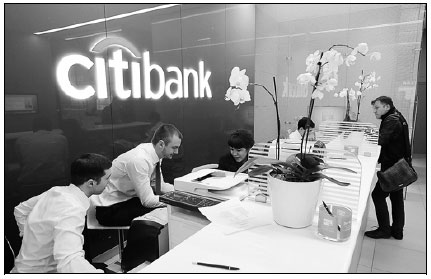Western sanctions spur Russia deposit fight
Oksana Semenikhina, a customer of Citigroup Inc's Russian unit for the past decade, got an offer from the lender this year that she couldn't pass up.
"They offered to open a rouble term deposit for me at 9 percent interest, through a mobile application," said the 31-year-old marketing manager in Moscow. "Previously, the rate was never higher than 5 percent, and you had to go to the office to do a lot of paperwork."
ZAO Citibank's proposal is part of a wider effort by international lenders in Russia to compete with local rivals for consumer deposits after sanctions sent the rouble plunging last year, spurring rate increases that drove up financing costs for banks and their clients.
The units of foreign lenders already lost some large corporate clients as sanctioned state banks, cut off from US and European capital markets, wooed exporters with higher rates for deposits in euros and dollars, three people with knowledge of the situation said in November. That has made consumer deposits more important.
"Before the crisis, retail rouble deposit rates at the most conservative units of foreign banks were lower than what the state banks were offering," said Maxim Osadchiy, an analyst at Bank BKF Ltd in Moscow. "Now they are matching the level, or even offering higher rates."
Sberbank, Russia's largest lender, offered rates as high as 11.25 percent last month on rouble term deposits, up from 7.25 percent a year earlier, according to data from Frank Research Group. Citibank's rates rose as high as 13 percent last month, up from 6.5 percent a year before.
Double-digit rates
The Russian subsidiary of Milan-based UniCredit SpA, the country's largest foreign-owned bank, is offering as much as 14 percent annually on rouble deposits, while Rosbank, owned by France's Societe Generale SA, is paying up to 16.3 percent for three-year deposits, according to their websites.
Lenders will probably have to pay double-digit rates on deposits throughout 2015, even as the central bank lowers borrowing costs from an 11-year high, said Yury Tulinov, head of research at Rosbank. The central bank raised the key rate six times to 17 percent last year, and has since lowered it to 14 percent.
Units of Citigroup, Raiffeisen Bank International AG and UniCredit, which typically catered to more affluent clients, are trying to broaden their deposit bases, said Yury Gribanov, the founder of Frank Research Group in Moscow.
"The banks have turned to funding from the retail market and offer higher deposit rates, as they can't always rely on their parents for cash," said Gribanov.
The rouble's collapse last year prompted a bout of capital flight, while more Russians are being forced to tap their savings to make ends meet as sanctions and falling oil prices hurt the economy. An increasing portion of consumer loans are going bad, while the value of new loans fell in the first two months of the year.
|
Employees work in a Citibank bank branch in Moscow. Some foreign lenders have lost some large Russian corporate clients to state banks offering higher rates for deposits in euros and dollars. Andrey Rudakov / Bloomberg |

























